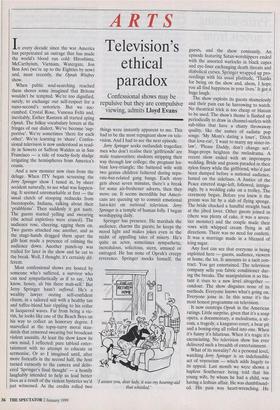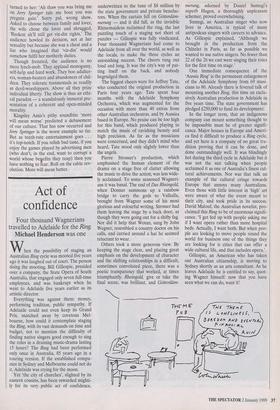ARTS
Television's ethical paradox
Confessional shows may be repulsive but they are compulsive viewing, admits Lloyd Evans In every decade since the war America has perpetrated an outrage that has made the world's blood run cold: Hiroshima, McCarthyism, Vietnam, Watergate, Jon Bon Jovi (we're up to the Eighties by now) and, most recently, the Oprah Winfrey show.
When public soul-searching reached these shores some imagined that Britons wouldn't be tempted. We're too dignified, surely, to exchange our self-respect for a nano-second's notoriety. But we suc- cumbed. Crystal Rose, Vanessa Feltz and, inevitably, Esther Rantzen all started aping Oprah. The folksy vocabulary hovers at the fringes of our dialect. We've become 'sup- portive'. We're sometimes 'there for each other'. We're learning to 'share'. Confes- sional television is now understood as read- ily in Soweto or Saffron Walden as in San Francisco — a tide of touchy-feely sludge irrigating the hemispheres from America's coasts.
And a new monster now rises from the deluge. When ITV began screening the Jeny Springer show I tuned in, by sheer accident naturally, to see what was happen- ing. It seemed unremarkable at first — the usual clutch of stooping rednecks from Incestopolis, Indiana, talking about their `prahblems'. Then suddenly it got nasty. The guests started yelling and swearing (the actual expletives were erased). The audience rose, cheering, egging them on. Two guests attacked one another, and as the stage-hands dragged them apart the glib host made a pretence of calming the audience down. Another punch-up was trailed for later in the show and he cut to the break. Well, I thought, it's certainly dif- ferent.
Most confessional shows are hosted by someone who's suffered, a survivor who can nod sympathetically as if to say, `Ah know, honey, ah bin there mah-self.' But Jerry Springer hasn't suffered. He's a wealthy lawyer oozing self-confident charm, in a tailored suit with a healthy tan and toffee-blond hair rippling to his collar in lacquered waves. Far from being a vic- tim, he looks like one of the Beach Boys on his way to collect an honorary degree. I marvelled at the topsy-turvy moral stan- dards that censored swearing but broadcast violent assaults. At least the show knew its own mind, I reflected: pure tabloid enter- tainment with no attempt to educate or sermonise. Or so I imagined until, after more fisticuffs in the second half, the host turned earnestly to the camera and deliv- ered 'Springer's final thought' — a homily laughably intended to help us lead better lives as a result of the violent hysterics we'd just witnessed. As the credits rolled two things were instantly apparent to me. This had to be the most repugnant show on tele- vision. And I had to see the next episode.
Jeny Springer seeks outlandish tragedies: men who don't realise their 'girlfriends' are male transvestites; students stripping their way through law college; the pregnant les- bian love-triangle; the battered wife with two genius children fathered during sepa- rate-but-related gang bangs. Each story gets about seven minutes, there's a break for some air-freshener adverts, then they move on. It seems incredible but Ameri- cans are queuing up to commit emotional hara-kiri on national television. Jeny Springer is a temple of human folly. I began worshipping daily.
Springer has presence. He marshals the audience, charms the guests; he keeps the mood light and makes jokes even in the midst of appalling tales of misery. He's quite an actor, sometimes sympathetic, incredulous, solicitous, stern, amused or outraged. He has none of Oprah's creepy reverence. Springer mocks himself, the 'I assure you, dear lady, it was my hearing-aid that whistled' guests, and the show constantly. An episode featuring Satan-worshippers ended with the assorted warlocks in black capes and eye-liner exchanging death threats and diabolical curses. Springer wrapped up pro- ceedings with his usual platitude, 'Thanks for being on the show and, ahem, I hope you all find happiness in your lives.' It got a huge laugh.
The show exploits its guests shamelessly and their pain can be harrowing to watch. No theatrical trick is too cheap or blatant to be used. The show's theme is flashed up periodically to draw in channel-surfers with sub-titles that have a chatty throwaway quality, like the names of sadistic pop songs: 'My Mom's dating a loser', 'Ditch that love-rat', 'I want to marry my sister-in- law', 'Please Daddy, don't change sex'. Stage-props heighten the melodrama. A recent show ended with an impromptu wedding. Bride and groom paraded in their nylon finery while the girlfriend, who'd just been dumped before a national audience, fumed on the sidelines. A Justice of the Peace entered stage-left, followed, intrigu- ingly, by a wedding cake on a trolley. The ceremony began. Before you knew it the groom was hit by a slab of flying sponge. The bride chucked a handful straight back at the jilted lover. Other guests joined in (there was plenty of cake, it was a seven- tier monster) and the couple made their vows with whipped cream flying in all directions. There was no need for confetti. It was a marriage made in a blizzard of icing sugar.
Any fool can see that everyone is being exploited here — guests, audience, viewers at home, the lot. It amounts to a tacit con- tract. You get entertained. The television company sells you fabric conditioner dur- ing the breaks. The manipulation is so bla- tant it rises to a new level altogether candour. The show disguises none of its methods. Everyone knows what's going on. Everyone joins in. In this sense it's the most honest programme on television.
It now outstrips Oprah in the American ratings. Little surprise, given that it's a soap opera, a documentary, a melodrama, a sit- com, a tragedy, a kangaroo court, a bear pit and a boxing-ring all rolled into one. When it's funny it's hilarious. When it's tragic it's excruciating. No television show has ever delivered such a breadth of entertainment.
What of its morality? At a personal level, watching Jerry Springer is an indefensible act of voyeurism — which adds hugely to its appeal. Last month we were shown a hapless Southerner being told that his young wife, by whom he had a child, was having a lesbian affair. He was dumbfound- ed. His pain was heart-wrenching. He turned to her: `Ah thaw you was bring me on Jeny Springer tale me bout you was pregnin gain.' Sorry pal, wrong show. Asked to choose between family and lover, the wife chose the lover and shrugged, `Reckon ah'll still get viz-din rights.' The audience howled its derision, not at her sexuality but because she was a cheat and a liar who imagined that `viz-din' would somehow fulfil her motherly duties.
Though frenzied, the audience is no mere lynch-mob. They applaud monogamy, self-help and hard work. They boo adulter- ers, woman-beaters and abandoners of chil- dren. They tolerate transsexuals as readily as devil-worshippers. Above all they prize individual liberty. The show is thus an ethi- cal paradox — a scandalously immoral pre- sentation of a coherent and open-minded morality. Kingsley Amis's pithy soundbite 'more will mean worse' predicted a debasement of our culture. That has now occurred and Jerry Springer is the worst example so far. But as tenth-rate entertainment goes . it's top-notch. If you relish bad taste, if you enjoy the games played by advertising men (who don't, in the end, want to corrupt a world whose be Refits they reap) then you have nothing to fear. Roll on the cable rev- olution. More will mean better.



























































 Previous page
Previous page